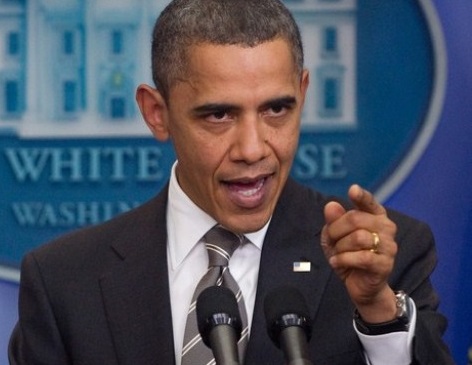I saw this on SNL (yeah, I know) a couple weeks ago while I was visiting my folks in Alabama.
This is a truly awful impression, but if you can get around that, I think that the sketch is one of the few things SNL has done in a long time that’s both genuinely funny and politically insightful.
Thanks to a mention by Matt Welch, here’s Chris Hedges, in truthdig last month, writing Stop Begging Obama and Get Mad
:
The right-wing accusations against Barack Obama are true. He is a socialist, although he practices socialism for corporations. He is squandering the country's future with deficits that can never be repaid. He has retained and even bolstered our surveillance state to spy on Americans. He is forcing us to buy into a health care system that will enrich corporations and expand the abuse of our for-profit medical care. He will not stanch unemployment. He will not end our wars. He will not rebuild the nation. He is a tool of the corporate state.
The right wing is not wrong. It is not the problem. We are the problem. If we do not tap into the justifiable anger sweeping across the nation, if we do not militantly push back against corporate fraud and imperial wars that we cannot win or afford, the political vacuum we have created will be filled with right-wing lunatics and proto-fascists. The goons will inherit power not because they are astute, but because we are weak and inept.
— Chris Hedges, truthdig (2009-09-14): Stop Begging Obama and Get Mad
And here’s Robert Scheer on the Changeling’s first year of rule:
A president has only so much capital to expend, both in tax dollars and public tolerance, and Barack Obama is dangerously overdrawn. He has tried to have it all on three fronts, and his administration is in serious danger of going bankrupt. . . . Yes, Obama was presented with a series of crises not of his making but for which he is now being held accountable. He is not a "socialist" who grew the federal budget to astronomical proportions. That is the legacy of George W. Bush, who raised the military budget to its highest level since World War II despite the end of the Cold War and the lack of a formidable military opponent— a legacy of debt compounded by Bush's decision to first ignore the banking meltdown and then to engage in a welfare-for-Wall-Street bailout. And it was Bush who gave the pharmaceutical companies the gift of a very expensive government subsidy for seniors' drugs.
But what is nerve-racking about Obama is that even though he campaigned against Bush's follies he has now embraced them. He hasn't yet managed to significantly reduce the U.S. obligation in Iraq and has committed to making a potentially costlier error by ratcheting up America's "nation-building" role in Afghanistan.
Just as he was burdened with the Afghanistan situation, Obama was saddled with a banking crisis he didn't cause, and the worst that can be said of his attempted solutions to the financial mess is that they were inherited from Bush Treasury Secretary Henry Paulson. But Obama, who raised questions before his election about the propriety of a plan that would rescue the banks but ignore the plight of ordinary folks, has adopted that very approach as president. He elevated Lawrence Summers and Timothy Geithner, the two Democrats most closely aligned with Paulson's policy, to top positions in his government.
. . . Without a government program as a check on medical costs, Obama will end up with a variant of the Massachusetts program, one that forces consumers to sign up with private insurers and costs 33 percent more than the national average. He will have furthered the Bush legacy of cultivating an ever more expensive big government without improving how the people are served.
— Robert Scheer, truthdig (2009-09-15): Obama's Presidency Isn't Too Big to Fail
Here’s Jesse Walker, in an article from a couple weeks ago for reason.com, Obama Is No Radical: But maybe we’d be better off if he were.
Thus far, the president’s domestic agenda has been many things, but radical it isn’t. Radicals make sudden turns. Obama sometimes slams his foot on the accelerator—just look at projected spending for the next few years—but he hardly ever tries to change direction. Radicals tear down centers of power. When Obama is faced with a crumbling institution, his first instinct is to prop it up.
That was most obviously true with the bailouts, a series of corporate preservation programs that began before he took office and have only increased since then. Candidate Obama voted for the Troubled Asset Relief Program, the 2008 bailout for failing financial institutions, and he personally intervened to urge skeptical liberals to support it. After Congress refused to authorize a bailout of the car companies, Obama followed George W. Bush in ignoring the plain language of the law and funneling funds to them anyway. Like Bush before him, Obama took advantage of such moments to adjust the institutional relationship between these nominally private businesses and the state: firing the head of General Motors, urging the company to consolidate brands, pushing for new controls on Wall Street pay. But the institutions themselves were preserved, in some cases enriched. The radical thing to do would have been to let them collapse.
And no, I’m not using “radical” as a euphemism for “free-market libertarian.” A radical Obama still might have extended assistance to the people displaced by the corporate failures, perhaps even setting up a generous guaranteed income scheme. He might have broken up the big banks. He might have done all sorts of things, some wiser than others. But he would not have strengthened the corporate-state partnerships bequeathed to him by Bush.
. . . Now we have health care reform. Here you might actually expect the president to veer in a new direction and let a powerful institution die. After all, it’s been only six years since he described himself as “a proponent of a single-payer, universal health care plan,” and if he were serious about that it would mean the end of the private health insurance industry. . . .
First, it’s increasingly unlikely that a public option will be a part of the bill that emerges, in which case we’ll be left with an enormous boondoggle for the industry: a law requiring every American to buy health insurance or else face legal sanctions. . . . Second, and more important, a system with more government-provided insurance, even one with only government-provided insurance, would still accept the institutional premises of the present medical system. Consider the typical American health care transaction. On one side of the exchange you’ll have one of an artificially limited number of providers, many of them concentrated in those enormous, faceless institutions called hospitals. On the other side, making the purchase, is not a patient but one of those enormous, faceless institutions called insurers. The insurers, some of which are actual arms of the government and some of which merely owe their customers to the government’s tax incentives and shape their coverage to fit the government’s mandates, are expected to pay all or a share of even routine medical expenses. The result is higher costs, less competition, less transparency, and, in general, a system where the consumer gets about as much autonomy and respect as the stethoscope. Radical reform would restore power to the patient. Instead, the issue on the table is whether the behemoths we answer to will be purely public or public-private partnerships.
So I can’t agree with Horowitz, Hannity, or Andy Williams. The president could pal around with militiamen, hook a money hose from the Treasury to ACORN HQ, and sleep each night with a Zapatista plush doll, but as long as his chief concern is preserving and protecting the country’s largest corporate enterprises, the biggest beneficiaries of his reign will be at the core of the American establishment.
— Jesse Walker, reason (2009-09-30): Obama Is No Radical: But maybe we’d be better off if he were.
If you want a recipe for real disgust with the prevailing political establishment, and a real opening for radical critique, one of the things that has to happen is that dissidents need to begin to see that even the longed-for best-case scenario can’t possibly deliver what they want, because what they were promised just won’t fit through the political channels that they had put their hope in. An obvious tool like George W. Bush inspires a lot of fear and loathing; but he also inspires a lot of faith in the myth that if only someone who wasn’t such an obvious tool were in power, these problems would all get sorted out right quick. But when you have a ballyhooed reformer holding the reins of power, over-promising and under-delivering — and when it becomes increasingly clear that politics as usual will keep on keeping on — that’s often when you begin to see a real chance for a crack-up. If the organizers and the dissidents know what to make of the situation, knows how to connect with that kind of disappointment and anger, and can offer a real alternative to the failure of within-the-system political reforms. (Which is part of the reason why I take out-Lefting the Left, and introducing people-powered, direct-action alternatives to electoral politics, to be really essential for left-libertarians right now.)
Perhaps it’s appropriate that we’re watching this go down as we pass through the 20th anniversary of Fall 1989. I can only HopeTM that we might yet see Barack Obama end up playing the Gorbachev of American imperial politics.





